David Arnaiz Gil
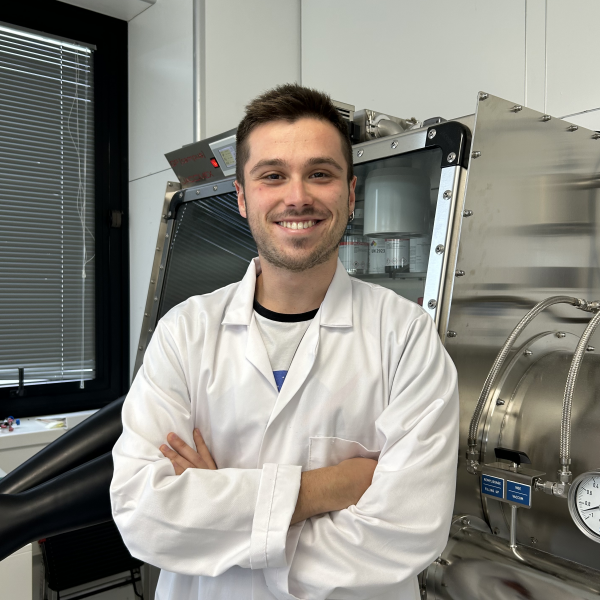 read
readinterview
Universidad de Burgos
David Arnaiz Gil

Universidad de Burgos
What is your role in the MeBattery team at Burgos University? My role in the MeBattery team at Burgos University (UBU) is to develop advanced analytical techniques to follow the mediation process in line/operando and in situ. With these techniques, we can study different variables that affect the mediation process, such as the anion and cation of the electrolyte and their concentration or the current density we use to cycle the battery. Last December, the UBU team stayed at Diamond Light Source (UK) to perform XANES in line/operando and in situ experiments on redox-mediated flow batteries.
Is this your first experience working on an EU funded project? What is your opinion about this programme? Yes, this is my first experience working on an EU funded project. This programme gives us, young researchers, the opportunity to work on a multidisciplinary team, meet other young researchers with similar interests and learn from senior researchers outside our institutions. These types of programmes need to be promoted and need more money to invest in so that good quality science can be generated, and strong scientific networks can be built within the different European countries. How do you see the field of sustainable batteries evolving in the future? Sustainable batteries will play a fundamental role in the development of our society and the way we use energy. Developing useful electrochemical energy storage devices for the future and reducing the use of critical raw materials is crucial for sustainability and fighting against the climate crisis we are in. These batteries are going to be the game changers in the energy storage field, and hopefully, in the future, we will see our technology working on a real scale. MeBattery is coming to an end in a few months, what impact do you think the project will have? The MeBaterry project will have an impact due to the scientific innovation developed by the team. Hopefully, when the end of the project comes, all the knowledge and technology generated in the project can be transformed into a new and disruptive battery prototype. Furthermore, with a deeper study and work, all the knowledge generated in the frame of the project can be used for an industrial and real-scale battery prototype. Also, as sustainability is one of the objectives of the project, a greener and more efficient energy storage technology than the state-of-the-art will be built, which will have a clear impact on the energy transition.
Murilo Leite Alcantara
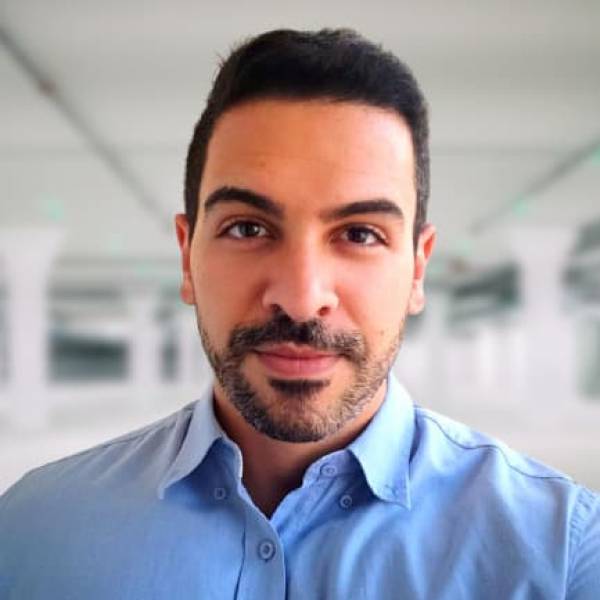 read
readinterview
CICECO - Aveiro Institute of Materials
Murilo Leite Alcantara

CICECO - Aveiro Institute of Materials
What is your research focus at the University of Aveiro?
My work at the University of Aveiro focuses on finding more efficient ways to separate and combine liquids in flow batteries. Using a tool called COSMO-RS, we can predict which materials will work well together before running actual experiments. This saves time and resources and reduces waste. My research aims to identify the best materials to create stable, long-lasting flow batteries that don’t need a membrane. The membrane removal is the core concept of the MeBattery project, and its goal is to reduce costs by removing an expensive component, and resistance, possibly allowing faster charge and discharge of the final battery.
What are your major achievements in the project so far?
One of my main accomplishments has been using COSMO-RS to identify and test modifications in redox materials, which play a key role in flow batteries. I’ve also helped our team find combinations of materials that create a stable environment and allow for high efficiency. Together, we’ve identified systems with less cross-contamination and low-pressure drop, which is essential for reducing maintenance and operational costs.
You recently took part in a training course within the scope of the MLDES portfolio. Can you tell us more about it?
The MLDES training was instrumental in understanding how to position this membrane-free technology for the market. It gave us insights into how important it would be for the client to have increased battery safety, energy density, and cost-effectiveness. We’re now working on solutions to reduce viscosity, which will lower the energy needed to operate the battery and costs. We’re also looking at ways to increase energy density, which means we can store more energy in the same space, a feature that could make our technology highly competitive.
The project is approaching its final stretch. What are your expectations for this final period?
As we near the project’s end, our focus is on fine-tuning the system to ensure it’s both stable and efficient. Specifically, we’re working on stabilizing the system without allowing any unwanted mixing of materials, which could lower efficiency. My goal is to have a robust solution by the end that shows clear potential for practical use in the MeBattery application. This would bring us a step closer to delivering a high-performance, market-ready energy storage solution.
What is your research focus at the University of Aveiro?
My research at the University of Aveiro centers on the thermodynamics of biphasic systems, leveraging COSMO-RS as a predictive tool to identify optimal alternatives. This approach allows us to pre-screen options before conducting experiments, saving time and resources while minimizing material waste. By using COSMO-RS, we can also gain a deeper understanding of the interactions between species, helping us grasp the fundamentals of liquid-liquid formation and species partition. These insights are crucial for identifying suitable electrolytes for flow batteries that offer stability and low cross-contamination, enabling the potential for a membrane-free flow battery design.
What are your major achievements in the project so far?
My personal key achievement has been identifying derivatizations of redox mediators and material combinations via COSMO-RS to create aqueous biphasic systems with high partitions. This includes modifications to increase partition and the incorporation of stabilizing ions, which maintain low viscosity and minimize cross-contamination. Overall, our team’s major accomplishments include identifying promising biphasic systems that provide a stable liquid-liquid interface with high partition ratios. These advancements move us closer to realizing a flow battery system without a membrane, improving both efficiency and stability.
You recently took part in a training course within the scope of the MLDES portfolio. Can you tell us more about it?
The MLDES training was invaluable for understanding how the membrane-free device can align with future market needs. It provided insights into commercialization strategies and emphasized the importance of targeting client priorities like safety, energy density, and cost. This understanding is guiding us in designing a device with a technology readiness level (TRL) of 2-3 that addresses these anticipated demands. Specifically, we are focusing on developing biphasic systems with low viscosity to reduce pressure drop and operational costs. Additionally, the training has sharpened our strategies for improving energy density through thermodynamic principles, which could be applied in future MeBattery developments.
The project is approaching its final stretch. What are your expectations for this final period?
As we approach the project's conclusion, our primary task is to stabilize the solid booster in the biphasic system. Our efforts will focus on identifying systems that offer low cross-contamination but also contain sufficient concentrations of stabilizing ions in the target electrolytes. We plan to explore several approaches to achieve this balance. My expectation is that, by the end of the project, we will have identified a functional system with significant potential for MeBattery applications, positioning us closer to delivering an operational solution for membrane-free energy storage.
Igor Echevarría
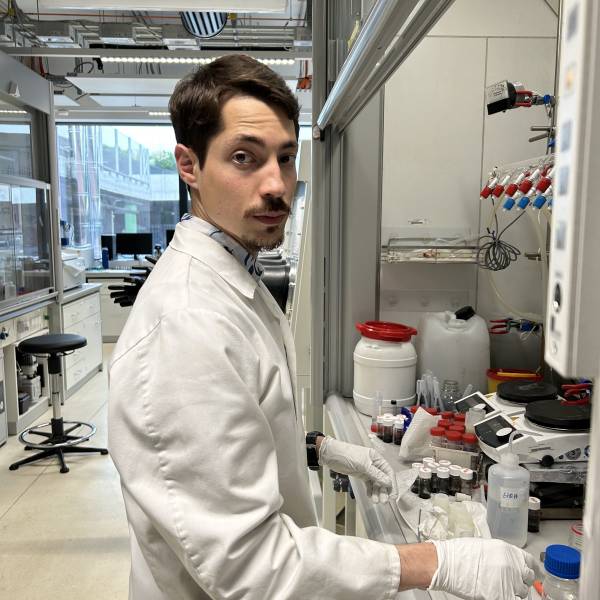 read
readinterview
Institute of Science and Technology Austria
Igor Echevarría

Institute of Science and Technology Austria
What is your role in the team at the Institute of Science and Technology (ISTA) and how has it evolved during MeBattery? My role at ISTA has always been preparing and characterizing new materials, but at some point, I have also been partially assigned to do some basic electrochemical characterization to help out the team in studying the materials when more hands were needed. Now that we have established the general protocols for preparing the materials and since my colleague Mario Palacios Corella left ISTA to take a postdoctoral junior fellowship by “La Caixa Foundation” in Barcelona, I continue to do the remaining tasks in the project on my own.
Why is this field of research so exciting? I think it is so exciting since a lot of things are still not really clear when it comes to Prussian blue analogues (PBAs), especially for the anodic ones. This kind of search for the answers, which leads to revealing new knowledge, is always challenging and fascinating.
What are the advantages for young researchers working in an EU-funded project? Working in an EU-funded projects gives you the great advantage of having a wide and reliable network of collaborators with the same ultimate goal. I think that having a group of people at ISTA and in the project with huge knowledge in the field and with the same final objective really makes the difference in science.
What impact, do you think, will MeBattery have on the European energy sector? That is a very interesting question. For me, at this point, it is impossible to predict how good the final prototype of the battery developed in the project will be. But I think that the fundamental idea of the project, the use of abundant materials to which there is access in the EU and the aim of developing greener alternatives, will show the general guidelines to be followed by the sector in the future.
Nomnotho Sphumelele Jiyane
 read
readinterview
Ruhr University Bochum
Nomnotho Sphumelele Jiyane

Ruhr University Bochum
What are your specific tasks in the MeBattery team at Ruhr University Bochum? Our work uses advanced electrochemical techniques to investigate the nano-micro electrochemical properties of the solid active material confined in the external reservoir of the redox flow battery. We evaluate the electrochemical stability and kinetics of the solid active materials at different operating conditions.
Why is this field of research so exciting to you? Redox flow batteries have the potential to significantly impact the energy storage field in the near future. This is particularly important given the rapidly increasing demand for battery technology, which aligns with global efforts to reduce the environmental impact.
What do you like about working in a collaborative project like MeBattery? The project is enabling us to build networks and learn through collaboration with other research groups. This is inspiring because I get to work with the experts. It is also diverse; I think this fosters a more comprehensive approach to innovation.
How do you see the field of sustainable batteries evolving in the future? It's a broad field, but the work produced by the MeBattery project will massively contribute to advancements in stationary storage, leading to the implementation of redox flow batteries, based on non-toxic and clean energy conversion. I am also excited to see how the technologies and systems would evolve over the next years.
Gimena Marín Tajadura
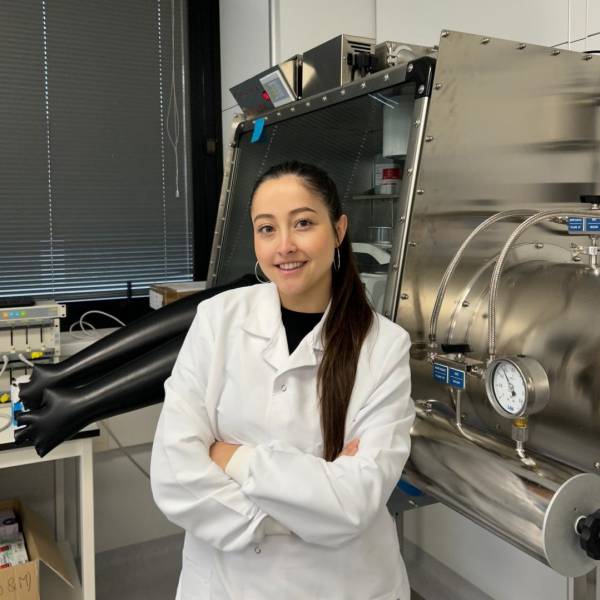 read
readinterview
Universidad de Burgos
Gimena Marín Tajadura

Universidad de Burgos
What is your role in the MeBattery team at UBU? What expertise did you acquire from your involvement in MeBattery? Within the MeBattery team at Universidad de Burgos, the principal task I am investigating in is the confinement of the solid booster in the external reservoir. As I started my PhD at the same time as the project started, I have acquired knowledge about energy storage especially about redox flow batteries at the same time as I also learned several advanced electrochemical techniques.
After almost two years of MeBattery, what would you consider your major achievements? After nearly two years with MeBattery, our major achievements lie in the successful confinement of booster materials, leading to significantly higher efficiency in battery performance. However, we are still working on optimizing some variables of the booster such as porosity and size. What does it mean to you to be part of the MeBattery project? Being part of MeBattery is an opportunity to contribute to advancements in stationary energy storage which is crucial for the transition to renewable energy sources. Moreover, being involved in a Pathfinder EU project is really useful for international collaboration and for building relationships with other research groups. How do you see the field of sustainable batteries evolving in the future? The ecological transition will increase the demand of batteries for various applications such as electric vehicles or stationary energy storage for renewable energy sources. For mobility applications lithium ion batteries will still be the best option, for a more sustainable approach recycling technologies will be developed. For stationary energy storage, redox flow batteries that are based on non-critical materials are mandatory if they are to be implemented at large-scale (MWh), including mediated redox flow batteries that are the ones proposed in MeBattery.
Antonio Martínez
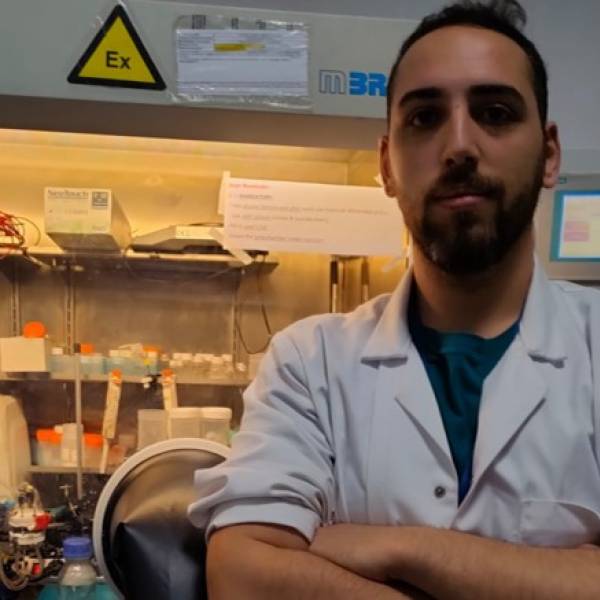 read
readinterview
IMDEA Energy
Antonio Martínez

IMDEA Energy
What is your research focus at IMDEA Energy? At the Electrochemical Processes Unit of IMDEA Energy, our focus is on developing a variety of electrochemical energy storage devices. One of our research areas is dedicated to study membrane-free redox flow batteries (MFree-RFB). Our work involves the chemical design and preparation of immiscible or biphasic electrolytes and characterize them physicochemically and electrochemically, determining properties such as density or pH. Once we have the electrolytes, we apply them to a redox flow battery without any separator and evaluate its performance.
What motivates you personally? Since I was a child, I have had a strong curiosity about the way things work. I have always been deeply interested in science and understanding the processes that revolve around electrochemistry, especially in the context of energy storage.
What makes working in the MeBattery project special for you? The MeBattery project provides an opportunity to collaborate with a diverse group of experts, each having their own specializations in different areas. This enriches my knowledge of energy storage and electrochemistry. Moreover, this project has the potential to revolutionize the field of batteries, which is incredibly exciting.
In your opinion, what impact does MeBattery have? In my opinion, energy and evolution have a historic synergy. In case of MeBattery, we witness an evolution in our understanding of a new type of battery that has the potential to address the world's high energy demand and improve our energy systems in a sustainable way.
Mario Palacios Corella
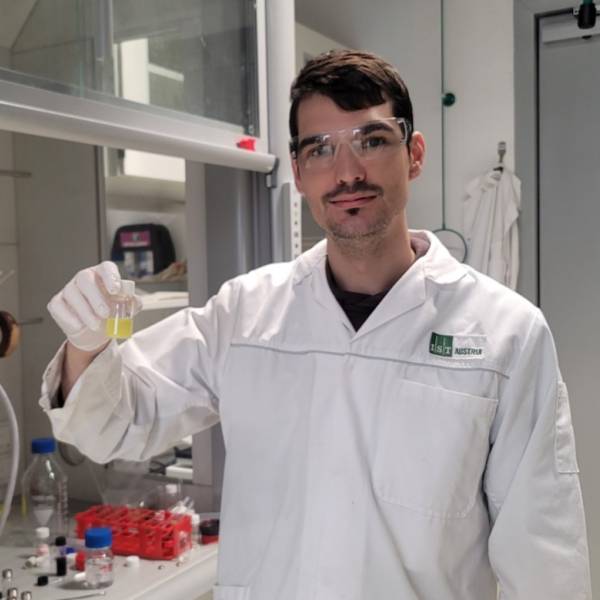 read
readinterview
Institute of Science and Technology Austria
Mario Palacios Corella

Institute of Science and Technology Austria
What is your research focus at IST Austria? At IST Austria we are developing new functional micro and nanomaterials that can be used as electroactive units in the battery. This work involves the chemical design and synthesis of the materials with a proper combination of organic ligands and metallic centers, but also the characterization of the material after its preparation to confirm the composition and purity.
Why is this field of research so exciting? The field is very exciting due to its intrinsic idea. The battery materials that we are developing for MeBattery are free of many toxic and critical elements like cobalt. In general, the use of such elements has a very important impact on the lives of the citizens. By getting rid of these elements, we aim to achieve more sustainable batteries that can compete with current technologies while lowering the environmental cost.
Is this your first experience working on an EU-funded project? What is your opinion about this programme? It’s not my first involvement in an EU-funded project, but it is my first involvement in a Pathfinder EU project. I think that the European Commission is doing a really good job by funding these innovative high-risk high-reward concepts that all in all aim to have a major impact in society.
How do you see the field of sustainable batteries evolving in the future? It is very hard to say as the field is very broad and divided into concepts that are different from each other each other. For example, there is a special interest in fully organic batteries that do not require the use of metals at all, and these are very exciting. But there’s also merit in the recent development of Zn-Air batteries, which have shown that can deliver a lot of power. Overall, the field should evolve in a direction where the economic and environmental costs are reduced to the minimum.
José Pedro Wojeicchowski
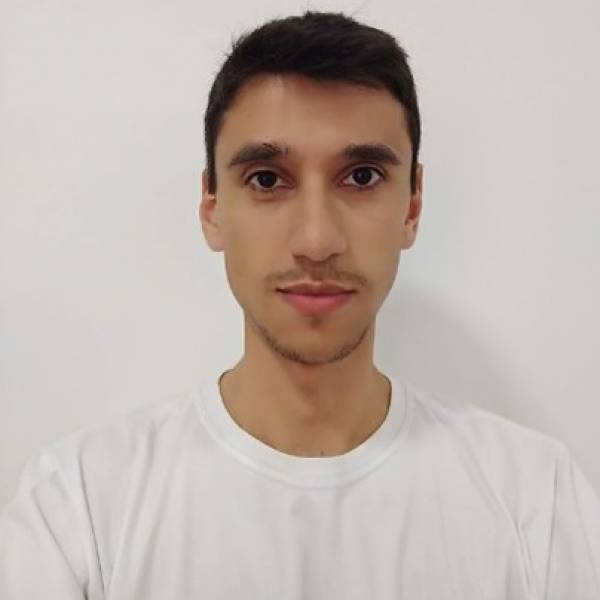 read
readinterview
Universidade de Aveiro
José Pedro Wojeicchowski

Universidade de Aveiro
José, you are leaving University of Aveiro by the end of April 2023, what were your specific tasks in the MeBattery team at University of Aveiro? During my time in MeBattery at University of Aveiro I focused on developing a predictive tool to estimate the partition coefficient of redox compounds. This involved running experiments in the lab to validate the model, as well as using different types of software, which I really appreciated. Developing this tool is critical for creating high-performance Membrane-Free Batteries based on aqueous biphasic systems, which could revolutionize energy storage. I'm excited to have played a role in this project and to have contributed to advancing this field.
How did the MeBattery project help you with your next career step? Working on the MeBattery project was an incredible learning experience for me. I was able to participate in meetings and discussions that went beyond just the technical details of the project. This helped me to develop both professionally and personally, and I feel that my skills as a researcher have greatly improved. Specifically, I gained experience with COSMO-RS (a thermodynamic model) and gained exposure to a new research area, focused on liquid-liquid equilibrium. I also developed transferable skills such as communication, teamwork, and project management. I believe that these skills will be valuable in my next career step, and I'm excited to apply them to my new challenges.
Having worked in an EU-funded project, what would you say is special about it? I really enjoyed working in an EU-funded project. MeBattery is unique in its scope and resources, which allowed me to develop new skills and learn new ways of working. For example, I learned to think like a planner and to share responsibilities and results with a multidisciplinary team. I also gained experience in managing resources and working in a cross-cultural environment. What made the project special to me was the network of people I worked with, who were all dedicated to making a positive impact on society. Being part of such a project was inspiring, and I believe that the work we did will have a lasting impact on the wider community.
In your opinion, what impact does MeBattery have? I believe that MeBattery has the potential to have a significant impact on energy storage in the near future. The combination of thermodynamic and electrochemical concepts, along with the efforts of a smart and hard-working team, is likely to result in a storage device that is more efficient, cost-effective, and environmentally friendly than existing technologies. This could have broader implications beyond just energy storage, such as enabling the wider adoption of renewable energy sources and helping to reduce carbon emissions. I am excited to see how the technology evolves in the coming years and to be a part of its development.
Carla Santana Santos
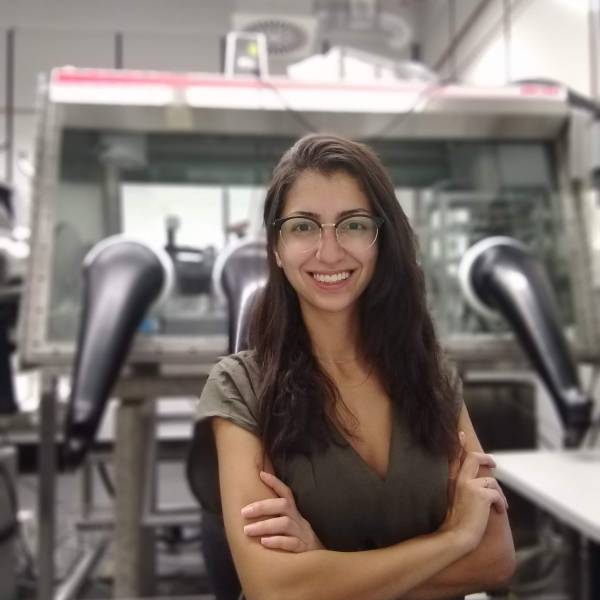 read
readinterview
Ruhr-Universität Bochum
Carla Santana Santos

Ruhr-Universität Bochum
What is your role in the MeBattery team at RUB? What is the expertise you are bringing in? My expertise are micro- and nanoelectrochemistry, which are powerful tools to investigate interfaces. Exploring that expertise will contribute to accessing the kinetics of the electron/charge transfer processes on the mediated biphasic battery interfaces. What made you go into science? I have been fascinated by the role of science in changing the human-nature relationship. Making science is the way to expand the knowledge of a society to overcome a current challenge. Searching for clean energy conversion and storage is the main challenge of our time, and that motivated me to work with electrochemistry, and to, particularly engage in research novel battery technology. In your opinion, what impact does MeBattery have? What is special about the project? It is known that our society faces the challenge of developing sustainable energy alternatives. MeBattery proposes a sustainable battery technology focused on overcoming some limitations in state-of-art technologies. Moreover, a large diversity of expertise is combined in MeBattery, which will allow to drive forward the research for a very ambitious alternative battery technology.
Lara Lubián
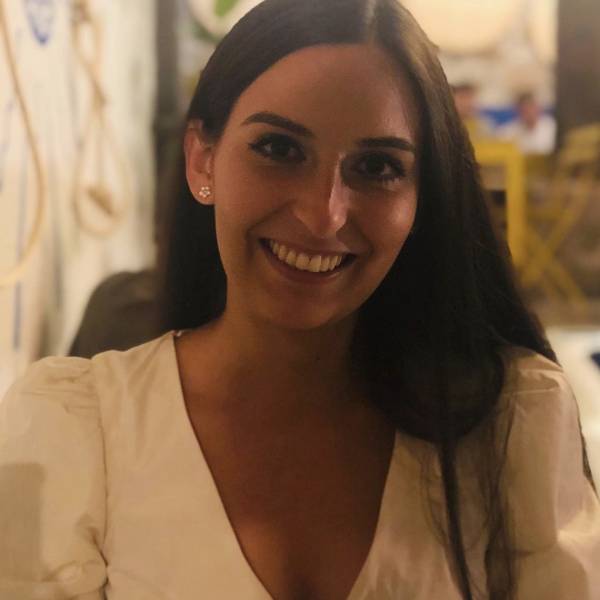 read
readinterview
Universidad de Burgos
Lara Lubián

Universidad de Burgos
What made you go into science? Why did you choose the topic of batteries? Since I was a kid, I have liked to help my community. During my studies, I realised that science would allow me to go one step forward and contribute to society. In particular, during the studies towards my Master's in Electrochemistry I decided that I wanted to work on energy storage to address the major challenge in the field of energy. Is it your first experience working on an EU-funded project? What is your opinion about this programme? I worked in other EU-funded projects, but MeBattery is my first EIC-funded project. In my opinion, the development of disruptive redox flow batteries is of key importance so that this programme is very useful to develop the next generation of technologies, which are not eligible for funding in other EU programmes. What are you currently working on within the scope of MeBattery? I contribute to making progress in MeBattery in two aspects. First, I develop a new methodology that enables fast electrochemical characterization. And second, I study degradation mechanisms with the aim of designing advanced materials for achieving high performances. What motivates you personally? Energy has been key in technology evolution for humanity. My research on redox flow batteries allows me to become a part of the next evolution, which will consist of abandoning fossil fuel. In the future, I wish I could say that I helped in this necessary transition by doing my bit.
